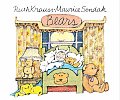Sendak as a Born Curmudegon
Among all the encomia for Maurice Sendak that have appeared in recent days, I particularly appreciated Michael Patrick Hearn’s clear-eyed remembrance posted at Educating Alice. Rather than focus exclusively on Sendak’s storytelling talent and contrarian statements about childhood, Hearn wrote about the personality that produced that work:
Such comments reminded me of Leonard Marcus’s recollection of meeting Sendak in Publishers Weekly:
As with the Lindbergh kidnapping (another memory Sendak invoked, this one really from his early childhood), the Holocaust seems more likely to have provided a focus for his anxiety and fears rather than their cause or inspiration. He explored themes of endangered children in his later books, when he could tell any story he wanted, because that situation struck deep chords with him.
Not that Sendak wasn’t also a charming person and a terrific picture-book creator, as both Hearn and Marcus describe. His critical writing was often very insightful, but I think it was at its best when he wrote about other people’s work rather than when he made pronouncements about childhood and literature based on his own idiosyncratic world-view.
Back to Hearn:
Almost every conversation began with the kvetching. Oh the kvetching! It was not a word I really knew until I met Maurice Sendak. He was constantly upset with this and that, with that person and this person. His anger fueled him. Look in the dictionary under the noun kvetch and you will find:Hearn also writes about how Sendak “loved being the provocateur,” and “was emotionally needy.”
But once he got that off his chest, he was the funniest person you could ever meet.
- A chronic, whining complainer.
- A nagging complaint.
- Maurice Sendak, American picture book artist-author.
Such comments reminded me of Leonard Marcus’s recollection of meeting Sendak in Publishers Weekly:
I arranged to be introduced to Maurice at the giant children’s breakfast at ABA, and at first he didn’t really look me in the eye. “Another interview?” he must have been thinking, as he commented on the banquet hall’s sprinkler system, which he said reminded him of a Nazi gas chamber.That remark would make sense for someone who’d actually been threatened by, you know, a Nazi gas chamber. But Sendak was born in Brooklyn in 1928. He lost Polish relatives in the Holocaust (the same sort of foreign relatives he cited as the scary inspiration for the Wild Things), and later described that news as introducing him early to thoughts of death. But Sendak was already eleven when Hitler invaded Poland, and I’m pretty sure every American child growing up during World War 2 had to think about death.
As with the Lindbergh kidnapping (another memory Sendak invoked, this one really from his early childhood), the Holocaust seems more likely to have provided a focus for his anxiety and fears rather than their cause or inspiration. He explored themes of endangered children in his later books, when he could tell any story he wanted, because that situation struck deep chords with him.
Not that Sendak wasn’t also a charming person and a terrific picture-book creator, as both Hearn and Marcus describe. His critical writing was often very insightful, but I think it was at its best when he wrote about other people’s work rather than when he made pronouncements about childhood and literature based on his own idiosyncratic world-view.
Back to Hearn:
No matter how many other directions he went into and how far he grew as an artist, everyone wanted another Wild Things. Once a book was published, he was through with it. He did not go back. He never wanted to repeat himself. He was constantly evolving. He called Wild Things the first in a trilogy that also embraced In the Night Kitchen and Outside Over There. But their artistic connection is dubious. What they did have in common was that Maurice was working out his therapy through them. The traumas of his childhood came out as metaphors. The books are fraught with Freudian symbols.Hearn calls attention to Sendak’s 2005 edition of Ruth Krauss’s Bears, a “sequel of sorts” to Wild Things since it included a wolf-suited Max. It was “one of the most delightful of Sendak’s books in many years,” Hearn says, but “almost universally ignored by the reviewers and the public.”



1 comment:
There are people who can complain entertainingly. There are people complain a lot but also have fun & interesting things to say.
There are people who you just want to get away from after awhile because their anger fends off pleasure.
Post a Comment